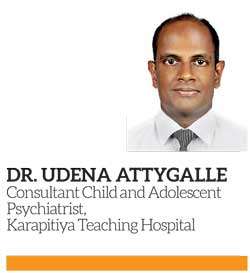09 Nov 2018 - {{hitsCtrl.values.hits}}

 Most of our readers are familiar with the term ‘dyslexia’. But do we know details of dyslexia , what it is, how it affects life and what intervention is possible? In this weeks’s Health Capsule, we decided to consult Dr. Udena Attygalle, Consultant Child and Adolescent Psychiatrist at the Teaching Hospital in Karapitiya, to obtain more information on the topic.
Most of our readers are familiar with the term ‘dyslexia’. But do we know details of dyslexia , what it is, how it affects life and what intervention is possible? In this weeks’s Health Capsule, we decided to consult Dr. Udena Attygalle, Consultant Child and Adolescent Psychiatrist at the Teaching Hospital in Karapitiya, to obtain more information on the topic.
How often do we take everyday skills that we possess; reading and writing for an example, for granted? Most of us have to just look at the sentences in the book or in this case the newspaper, that we are reading and our brains do all the work automatically regarding reading and interpreting the content before us. Now imagine looking at your favourite book and seeing only symbols or starting to write a letter to your friend living abroad, knowing just what to write, yet not knowing how to write it. That is the struggle that a dyslexic individual face every day.
Symptoms 
In preschool, when we are just learning to read and write, all of us see and identify letters as symbols, explains Dr.Attygalle. But, while most of the children learn to recognise, interpret and incorporate these letters into their reading and writing, after a certain period of time, the minority continues to have difficulty with them.
They usually cannot remember the letters of the alphabet, forgetting and writing letters the wrong way, for an example confusing their ‘b’ s with ‘d’ s. They find dictation especially hard, for an example writing ‘cat’ as ‘K-A-T’ instead of ‘C-A-T’. They also read in letters, pronouncing one letter of a word at a time, and being unable to grasp the meaning of the sentence immediately after reading.
These children tend to read and write very slowly when compared with the other children, but can understand well if explained verbally. This is because Dyslexia is not in any way a problem of intelligence, explains the doctor. In fact, these children can be very smart, their intelligence similar to that of the children of the same age group.
Their difficulties when it comes to letters will be frustrating as well as confusing to the child, his parents as well as the teachers, because they cannot figure out why he or she can’t cope with these seemingly simple tasks while performing well in other aspects of life.
If the child does not receive the support and understanding of his family and teachers, this may result in severe psychological distress to the child, with him being labeled as ‘slow’ or ‘stupid’. Such children tend to drop out of school early, and are exposed to the risk of anger and unhealthy coping mechanisms like substance abuse.

Recognising and treatment
Dyslexia is more accurately described as a spectrum, states Dr. Attygalle. So, the severity of the symptoms would change from child to child. Many of these children go into adulthood without being formally diagnosed as dyslectic. But, with time, they develop their own coping mechanisms to deal with the difficulties that they face and will cope with the demands of day to day life considerably well.
These children are usually identified by the class teacher and referred to a child psychiatrist or an educational psychologist. Most of the time, the child is referred with a complaint like ‘forgetfulness’ or ‘not paying attention in class’, explains the doctor. There are no specific tests to diagnose dyslexia due to the variations of disease symptoms from child to child, but can be diagnosed clinically after thoroughly assessing the child, including his reading and writing skills. They are also more likely to have certain other conditions like Attention Deficit Hyperactivity Disorder (ADHD), when compared to other children of their age.
Early diagnosis can usually result in a better outcome in dyslexia. Management is usually done by a multidisciplinary team, including educational psychologists, child psychiatrists, and speech and occupational therapists. Treatment will include special interventions in teachings which are more focused on the child’s needs. Parents and the teachers will also be instructed on how to help the child cope with the difficulties. Throughout all this love and support are invaluable to the child as well.
Good news
You do not have to fret about your child’s future just because he was given a diagnosis of dyslexia. In fact, many of the world’s leading personalities are either diagnosed or are suspected to have had dyslexia. This list not only includes Leonardo Da Vinci, Pablo Picasso, and Walt Disney, some of the most famous artists of their times, it also has the names of Albert Einstein, Winston Churchill and Steve Jobs. Some researchers even theorise that in order to compensate for their deficiencies, the individuals having dyslexia are more creative, having the ability to think outside the box, a trait that all the above mentioned personalities share. So, if you or your child has dyslexia, think about the positive side, while staying strong and fighting hard to overcome the difficulties.
22 Dec 2024 20 minute ago
22 Dec 2024 41 minute ago
22 Dec 2024 43 minute ago
22 Dec 2024 5 hours ago
22 Dec 2024 7 hours ago